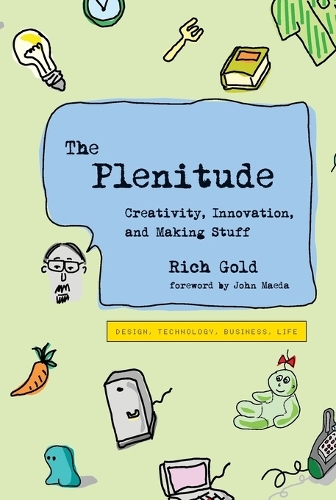
The Plenitude: Creativity, Innovation, and Making Stuff
(Paperback)
Publishing Details
The Plenitude: Creativity, Innovation, and Making Stuff
By (Author) Rich Gold
Foreword by John Maeda
MIT Press Ltd
MIT Press
22nd June 2021
United States
Classifications
General
Non Fiction
Impact of science and technology on society
Business and Management
Popular psychology
153.35
Physical Properties
Paperback
136
Width 137mm, Height 203mm
454g
Description
Lessons from and for the creative professions of art, science, design, and engineering- how to live in and with the Plenitude, that dense, knotted ecology of human-made stuff that creates the need for more of itself. We live with a lot of stuff. The average kitchen, for example, is home to stuff galore, and every appliance, every utensil, every thing, is compound-composed of tens, hundreds, even thousands of other things. Although each piece of stuff satisfies some desire, it also creates the need for even more stuff- cereal demands a spoon; a television demands a remote. Rich Gold calls this dense, knotted ecology of human-made stuff the "Plenitude." And in this book-at once cartoon treatise, autobiographical reflection, and practical essay in moral philosophy-he tells us how to understand and live with it. Gold writes about the Plenitude from the seemingly contradictory (but in his view, complementary) perspectives of artist, scientist, designer, and engineer-all professions pursued by him, sometimes simultaneously, in the course of his career. "I have spent my life making more stuff for the Plenitude," he writes, acknowledging that the Plenitude grows not only because it creates a desire for more of itself but also because it is extraordinary and pleasurable to create. Gold illustrates these creative expressions with witty cartoons. He describes "seven patterns of innovation"-including "The Big Kahuna," "Colonization" (which is illustrated by a drawing of "The real history of baseball," beginning with "Play for free in the backyard" and ending with "Pay to play interactive baseball at home"), and "Stuff Desires to Be Better Stuff" (and its corollary, "Technology Desires to Be Product"). Finally, he meditates on the Plenitude itself and its moral contradictions. How can we in good conscience accept the pleasures of creating stuff that only creates the need for more stuff He quotes a friend- "We should be careful to make the world we actually want to live in."
Reviews
...a wonderful read if you have any interest at all in art or science or design or engineering or creativity or innovation or the morality of our material culture or managing any of those people or processes...Some books are so good that you know you'll read them again, and you know this by the time you finish. With this book, I knew by page 25.--Computerworld--
Gold displays casual insights such as illustrating the sheer abundance of the plenitude by pointing out the variety of shirts in an audience and the work that went into each and pads this very skinny book with his own goofy cartoons. The result is a fun splash in some of the important ideas behind modern consumption.
--Publisher's Weekly--Gold's nimble mind unpacks the contradictions and consequences of our stuff-clotted world, quoting a friend's warning: 'We should be careful to make the world we actually want to live in.' This is not the traditional anti-materialist rant and that helps make it a valuable rumination on a prevailing 21st-century condition.
--The Morning News--This little book, with its simple logic and language and unforgettable, whimsical drawings, will change the way its readers look at the world around them.
--Susan Salter Reynolds, LA Times--Author Bio
Rich Gold (1950-2003) was an artist, composer, designer, inventor, lecturer, and writer. Equally at home in the worlds of avant-garde art, academia, and business, he worked at various times for Sega, Mattel, and Xerox PARC.
